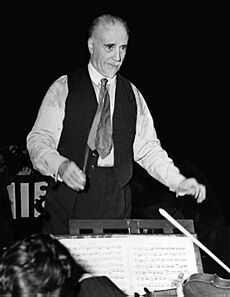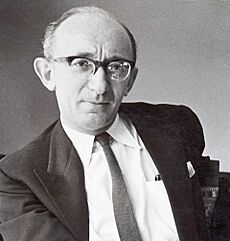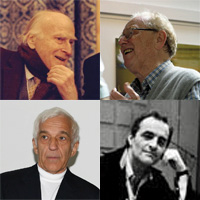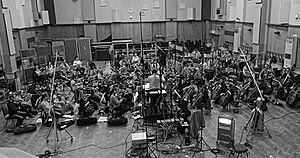Royal Philharmonic Orchestra facts for kids
Quick facts for kids Royal Philharmonic Orchestra |
|
|---|---|
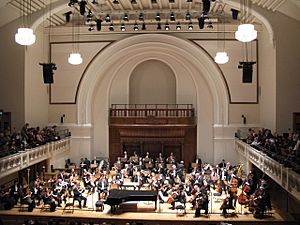
The RPO at Cadogan Hall, its home since 2004
|
|
| Short name | RPO |
| Founded | 1946 |
| Location | London, England, UK |
| Concert hall | Cadogan Hall Royal Albert Hall |
The Royal Philharmonic Orchestra (RPO) is a famous British orchestra based in London, England. An orchestra is a large group of musicians who play different instruments together.
The RPO was started by Thomas Beecham in 1946. In its early years, the orchestra made many recordings. They also played at important events like the Glyndebourne Festival Opera. After Beecham passed away in 1961, the RPO faced tough times. They struggled to survive until the mid-1960s. Their future became secure when the Arts Council of Great Britain suggested they should get public funding. Around the same time, there was a worry that the orchestra might lose its "Royal" title.
In 2004, the RPO got its first permanent home in London. This was at Cadogan Hall in Chelsea. The RPO also performs at the Royal Festival Hall and the Royal Albert Hall. They play concerts across the United Kingdom and in other countries. Since the 2021–2022 season, Vasily Petrenko has been the orchestra's musical director.
Contents
History of the RPO
How the Orchestra Began
In 1932, Sir Thomas Beecham had started another orchestra, the London Philharmonic Orchestra (LPO). He managed it with help from wealthy supporters. But during World War II, money became scarce. Beecham left to conduct in Australia and the US. The LPO continued without him, run by its own musicians.
When Beecham returned to England in 1944, the LPO welcomed him back. They played concerts together that critics loved. However, the LPO players, who now ran their own orchestra, did not want Beecham to have complete control. They wanted him to be a paid employee. Beecham said he would not be "wagged by any orchestra." He decided to create a new, great orchestra.
In 1946, Beecham made a deal with the Royal Philharmonic Society. His new orchestra would play at all the Society's concerts. This allowed him to name his new group the "Royal Philharmonic Orchestra." King George VI approved this name. Beecham also arranged for the RPO to be the main orchestra at the Glyndebourne Festival. He also got support from record companies. This led to many profitable recording deals.
A music writer named Lyndon Jenkins said that Beecham always found the best players. Beecham believed musicians were so good they would only play for him.
Beecham's Orchestra in Action
Beecham chose Victor Olof to help him find musicians. They looked for top players Beecham had worked with before the war. Four of these musicians had helped start the LPO fifteen years earlier. These included Reginald Kell (clarinet) and Gerald Jackson (flute). They also hired Archie Camden, a famous bassoon player. Dennis Brain, a principal horn player, played for both the RPO and another orchestra.
The Royal Philharmonic had its first rehearsal on September 11, 1946. Four days later, they played their first concert in Croydon. Beecham sent a message saying the concert was a "huge success." The orchestra played several concerts outside London first. Their first London concert was on October 26. The Times newspaper said the hall was "filled with golden tone." Before their London debut, the orchestra made its first recording. Within two years, they had made over 100 recordings.
The orchestra had 72 players, all on yearly contracts with Beecham. This meant he had first call on their services. However, they could still play for other groups. In the early 1950s, the orchestra's players became more stable. The RPO became known for its amazing woodwind section. This group included Jackson, Jack Brymer (clarinet), Gwydion Brooke (bassoon), and Terence MacDonagh (oboe). They were even called "The Royal Family."
The RPO toured the United States in 1950. They were the first British orchestra to visit America since 1912. Beecham had wanted to do this for a long time. They played 52 concerts in 45 cities over 64 days. The tour was a great success. Olin Downes of The New York Times praised their "magnificent music-making." In 1951, a critic from The Times said the RPO was one of the best orchestras.
The orchestra first played at the Proms in August 1952. Beecham made his Proms debut two years later. The Times called it "an evening of magnificent playing." In 1957, Beecham and the RPO toured Europe.
Beecham conducted his last concert on May 7, 1960. He suffered a heart attack the next month and passed away in March 1961.
The RPO from 1961 to 2000
Rudolf Kempe became the RPO's principal conductor in 1961. He became music director in 1962. After Beecham's death, some key players left the orchestra. In 1963, the orchestra became a self-governing company. But they soon faced problems. The Royal Philharmonic Society stopped hiring the RPO for its concerts. Glyndebourne also chose another orchestra. The RPO was even blocked from playing at the Royal Festival Hall.
Kempe resigned, but he came back soon after. With help from Sir Malcolm Sargent, the orchestra held its own successful concerts. A 1965 report suggested that all London orchestras should receive public funding. This helped the RPO.
The orchestra's link with the Royal Philharmonic Society was broken for a short time. For three years, it looked like the RPO might lose its "Royal" title. But in 1966, the Queen officially gave the title to the orchestra.
The RPO celebrated its 25th anniversary in 1971. They played a concert in Croydon, where they had first performed. Sir Adrian Boult conducted, and Clifford Curzon was the piano soloist. Five original orchestra members still played with the RPO at this concert.
Kempe was named "Conductor for Life" in 1970. He left the orchestra in 1975. Antal Doráti took over as chief conductor from 1975 to 1978. He helped improve the orchestra's playing standards.
In the 1980s, the British government reduced public spending. The RPO had to rely more on money from businesses. This kind of funding can be less stable over time.
Since 1993, the RPO has had a community and education program called "RPO Resound." This program helps more people experience great music. They work in places like homeless shelters, hospices, and prisons.
In 1994, the RPO played at a special concert in the Vatican City. This concert was to remember the Holocaust. Pope John Paul II and the President of Italy attended. It was shown on TV across Europe and the US.
The RPO in the 21st Century
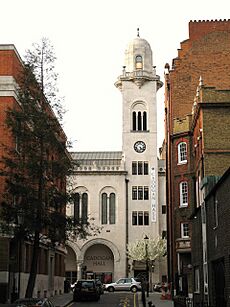
The RPO plays concerts every year at the Festival Hall. Since 2004, their main home has been Cadogan Hall. This used to be a church in Chelsea. It was turned into a concert hall with 900 seats. At the Royal Albert Hall, the RPO performs large orchestral works and popular classics.
The RPO returned to international television in 2005. They performed Beethoven's Missa Solemnis in Cologne Cathedral. This performance was shown on TV and released on DVD.
The orchestra also tours around the UK. They have regular performances in towns like Aylesbury and Crawley. The RPO often tours overseas too. Since 2010, they have played in countries like China, Japan, and the US. In 2010, they toured England playing Beethoven's music. Pinchas Zukerman was both the soloist and conductor. The RPO continues to play at the Proms. In November 2019, the Royal Albert Hall named the RPO its official associate orchestra.
The orchestra's community and education work continues today. In May 2013, young musicians and a large children's choir performed with the RPO. They played a piece created by the young participants.
In November 2022, three RPO performances were released on a streaming service. These included The Rite Of Spring, The Firebird, and Petrushka by Igor Stravinsky. In 2023, RPO musicians played at the coronation of Charles III and Camilla.
In March 2024, Sarah Bardwell was announced as the RPO's new managing director. In April 2024, Joe Hisaishi was named the orchestra's composer-in-association. Also in April 2024, the RPO extended Vasily Petrenko's contract as music director until the 2029-2030 season.
Musicians and Conductors
Many well-known musicians have been principal players in the RPO. String players include Steven Staryk and Clio Gould (leaders). Frederick Riddle was a principal viola player.
Woodwind principals have included Geoffrey Gilbert and James Galway (flute). Antony Pay (clarinet) and Michael Chapman (bassoon) also played key roles.
In the brass section, famous principals include Alan Civil (horn) and Philip Jones (trumpet).
After Dorati, chief conductors included Walter Weller (1980–1985) and André Previn (1985–1992). Vladimir Ashkenazy (1987–1994) and Yuri Temirkanov (1992–1998) also led the orchestra. Daniele Gatti was chief conductor from 1996 to 2009. Charles Dutoit was artistic director from 2009 until January 2018, when he resigned from his role.
From 1992 to 2000, Peter Maxwell Davies was an associate conductor and composer for the RPO. Other conductors who worked closely with the orchestra include Sir Charles Groves and Yehudi Menuhin. Pinchas Zukerman became the RPO's principal guest conductor in 2009. In January 2015, Alexander Shelley became Principal Associate Conductor.
Vasily Petrenko first guest-conducted the RPO in March 2016. In July 2018, the RPO announced him as their new music director. His contract began with the 2021–2022 season.
Recordings by the RPO
From its early days, the RPO made many recordings. They recorded for labels like His Master's Voice and RCA Victor. Many of these recordings are still considered "Great Recordings of the Century." These include music by Delius, Grieg, and Mozart.
After Beecham's death, the RPO made many recordings for Decca. Sometimes they used different names, like the "London Festival Orchestra." In the 1960s, the RPO also recorded with famous conductors like Sir John Barbirolli and Fritz Reiner. Soloists included Luciano Pavarotti.
Igor Stravinsky recorded his opera The Rake's Progress with the RPO in 1964. Colin Davis also made some of his first recordings with the orchestra. From 1964 to 1979, the RPO recorded Gilbert and Sullivan operas. The orchestra has also recorded for other labels like Deutsche Grammophon.
In 1986, the orchestra started its own record label, RPO Records. This was the first record label owned by a symphony orchestra. Their recordings include classical music, ballet scores, and film music. They even have albums like "Symphonic Rock."
Other Types of Work
Besides classical music, the RPO has recorded many film scores. These include music for movies like The Red Shoes and The Bridge on the River Kwai.
In 1985, the Royal Philharmonic Orchestra re-recorded music from Star Trek: The Original Series.
In 1987, the RPO created a sister group, the Royal Philharmonic Concert Orchestra. This group plays lighter classical music. In 1989, the RPO recorded a flamenco album called "Soy Gitano."
RPO musicians have also been part of many non-classical performances. In the 1960s, they played with the rock band The Nice. Later, they performed in Yanni Live at the Acropolis in Greece in 1993. In 1992, UEFA asked the orchestra to record the UEFA Champions League Hymn. Jamaican reggae singers John Holt and Freddie McGregor performed with the orchestra in 2003.
See also
 In Spanish: Royal Philharmonic Orchestra para niños
In Spanish: Royal Philharmonic Orchestra para niños



